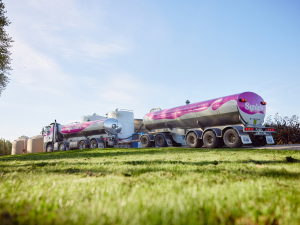Formula goes sour
OPINION: Media reports say global recalls tied to cereulide toxin contamination in milk-based nutrition brands could inflict combined financial losses exceeding $1 billion.
 Nestle is teaming up with Synlait and its 300 farmer suppliers to help fund innovative on-farm emissions reduction tools.
Nestle is teaming up with Synlait and its 300 farmer suppliers to help fund innovative on-farm emissions reduction tools.
One of the world’s largest dairy companies, Nestle is teaming up with Synlait and its 300 farmer suppliers to help fund innovative on-farm emissions reduction tools.
This investment is focused on pragmatic on-farm solutions that improve efficiency, such as effluent management systems, emissions-friendly feed options, advanced soil testing, alternative fertilisers and tree planting, splitting the costs three ways between Nestle, Synlait and its farmer suppliers across the next seven years.
Synlait chief executive Grant Watson says this new kind of customer partnership will help Synlait reach its greenhouse gas emission targets, as well as opening up potential new commercial opportunities to work together.
“This is a great example of proactive, industry-led solutions driving innovation across the supply chain, serving our customers’ demand for high quality, low-emissions products. Synlait’s industry-leading Lead With Pride programme has long financially incentivised Synlait farmers to produce some of the most sustainable dairy in the world, but this investment with Nestlé will help them go further, faster.”
“This partnership aims to reduce the cost of implementation and accelerate farmer adoption of emissions reduction tools. It’s leveraging technologies that are available in market right now, and will expand over time to include emerging technologies as they become available. This kind of agreement also opens up potential new opportunities to work together in other areas, and we look forward to a long and fruitful partnership with Nestlé.”
Nestle global chief procurement officer Patricia Stroup, speaking on a visit to New Zealand, says that partnerships of this kind which bring Nestlé together with farmers and processors, would be instrumental in all parties reaching their greenhouse gas emission targets.
“Dairy is both our single biggest ingredient by volume, and our largest source of Scope 3 greenhouse gas emissions, accounting for around 21% of our total emissions. None of us can do this alone. Knowing this drives us to find new ways of working together, and means we need to collaborate with our dairy suppliers to adopt new ways to reduce emissions, and with farmers to create plans for climate, methane and regenerative agriculture.
“While today’s announcement focuses on what can be delivered now, we are also continuing to develop new ways to reduce emissions through our own research, and external research partnerships. As our investigations continue, the most promising solutions are tested on research farms before being deployed more broadly. We are determined to draw on the best science worldwide, while ensuring that we deliver solutions that are locally relevant for farmers.”
The World Wide Sires National All Day Breeds Best Youth Camp Best All Rounder plaudit has become family affair, with 2026 Paramount Cup winner Holly Williams following in her sister Zara's footsteps.
DairyNZ is giving New Zealand farmers a unique opportunity to gain hands-on governance and leadership experience within the dairy sector.
Herd improvement company LIC has posted a 5.2% lift in half-year revenue, thanks to increasing demand for genetics.
According to the latest Fresh Produce Trend Report from United Fresh, 2026 will be a year where fruit and vegetables are shaped by cost pressures, rapid digital adoption, and a renewed focus on wellbeing at home.
The Roar is a highlight of the game hunting calendar in New Zealand, with thousands of hunters set to head for the hills to hunt male stags during March and April.
OPINION: The past few weeks have been tough on farms across the North Island: floods and storms have caused damage and disruption to families and businesses.

OPINION: Meanwhile, red blooded Northland politician Matua Shane Jones has provided one of the most telling quotes of the year…
OPINION: This old mutt has been around for a few years now and it seems these ‘once in 100-year’ weather…